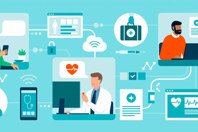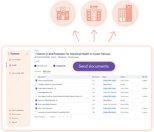INSIGHTS ON CLINICAL TRIAL TECHNOLOGIES
-
The Future Of Pharmacovigilance: Integrating AI
The use of AI in pharmacovigilance can enhance processes such as data analysis, signal detection, and case management by increasing efficiency, accuracy, and the ability to manage large datasets.
-
The Promise Of IQVIA One Home For Sites: A Site CEO's Perspective
By providing research sites with a unified, streamlined interface, we can reduce operational friction, enhance collaboration, and ultimately accelerate the development of new therapies.
-
How EDC-Based SAE Reporting Reduces Time To Detection And Response
Serious adverse events (SAEs) play a pivotal role in patient safety during clinical trials, and the right EDC system helps you efficiently track and manage the entire lifecycle of SAE reporting.
-
Why Managing Direct Spend In NetSuite Leads To Commercial Success
Centralizing direct spend with the right tools enables you to manage critical inputs within the ERP and organizations to gain visibility for accurate demand planning and supplier performance tracking.
-
Clinical Data Studio: A Single Data Review Platform Fostering Unification Across Groups6/19/2025
This end-to-end digital review platform can assist both your risk management team and data management team, improving speed and facilitating database lock times.
-
Powering More Efficient Clinical Development With AI And ML7/7/2025
Explore how AI and ML are revolutionizing clinical trials by automating data processes to accelerate research and transform data into actionable outcomes for patient care.
-
Transforming Oncology Trials With Next-Gen eCOA6/9/2025
With the FDA stating last fall that the “patient’s voice” is key to understanding real-world-impacts, eCOAs and ePROs are becoming quintessential tools for cancer trials.
-
Monitoring Activity And Gait In Children Using DHTs6/13/2024
Drug developers, researchers, patients, and regulators are recognizing the benefits of sensor-based digital health technologies for clinical research.
-
Automated Evidence Generation For Regulatory-Grade RWD10/20/2025
Global regulatory agencies increasingly adopt Real-World Evidence, demanding higher data quality and automated AI-driven platforms to meet evolving standards and improve drug development pathways.
CLINICAL TRIAL TECHNOLOGY SOLUTIONS
-
Activate real-time clinical trial management with the only software with 95% site adoption. Create a digital connection to every site in your study on a platform they already love and use in their workflows.
-
1,735 eCOA & ePRO Studies Completed
eCOA and ePRO with Enrollment, eConsent, Payments and EDC integrated. Our services cover build, licensing and 24/7 support.
95%+ Patient Compliance Rate
4-8 Weeks to Deploy
190+ Validated Instruments
-
All clinical trials need the same things: accurate, reliable data and methods to make it easier for patients and sites to participate. Learn how 11 of Signant Health's solutions are facilitating DCTs.
-
Effortlessly distribute, monitor, and exchange study documents with every site—wherever they work, whenever they need it.
Other tools promise site connections, but they can't deliver 100% coverage with a solution sites actually want.
Adoption
They claim sites use their tool…but you need sites to love it.
Tracking
They let you send documents…but you need to know the status of every document at every site.
Integration
They offer integration within their ecosystem…but you need compatibility with every site and sponsor software.
-
AI supports clinical data managers by streamlining reconciliation of adverse events, medical history, labs, and medications — reducing manual effort and improving data accuracy.














